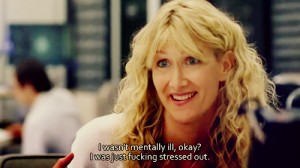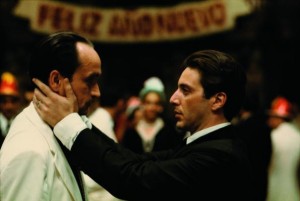
4 Steps (And a Bonus!) To Making Character Everything
As I said in the last post, one of the things we can learn from television is that character is everything. But how do we actually achieve that in fiction? Here are 4 steps and a practical example.
1. Make sure your key characters are obsessed and broken. I mentioned this in the last post as well, but what does it mean? Look at your favorite TV characters: Walter White from Breaking Bad is a perfect example.
Walter is obsessed with becoming a bigger and bigger player in the meth business. Which is probably a fairly normal trait for someone in the meth business. But Walter is broken because his attachment to meth stems not from money, which was his original version of things (he was dying of cancer and wanted to leave his family with some security after he was gone), but from a desperate need for respect. Family doesn’t really enter into it. Walter White is driven by pride — to the degree that he continues on despite the bodies and ruined lives and broken relationships piling up around him. Walter’s obsession is what helps him, a former high-school chemistry teacher, quickly become the biggest meth player in Albuquerque, New Mexico. Walter’s brokenness is what keeps him from getting out despite the fact that his work constantly endangers his life and the lives of those he supposedly loves.
But it’s not just in the “classy” TV dramas. Look at Elliot Stabler on Law & Order: SVU. Elliot (played by Christopher Meloni) is obsessed with catching sex-offenders and child-killers. Again, fairly normal for a police detective. But Elliot is broken by virtue of his need to make everything personal. Elliot has a family, you see, so every rapist is more than just a rapist, he’s the rapist who could be raping Elliot’s wife and kids. This vigilante mindset gets Elliot into trouble, as he crosses professional lines again and again to do what he thinks is right — often making the wrong call. (Though not nearly as many as his partner, Livia, who’s driven by her need to be pathetic.)
Emma Bovary is pretty goddamn obsessed and broken, ain’t she? The daughter of a farmer, she’s obsessed with living an exciting, rewarding life. Again, not that crazy an idea. (Though maybe it was for a woman in France in 1856.) But Emma is broken in that she will never be satisfied in life, and her hunger for the next thing, always the next thing, ensures she’ll keep making terrible choices. (Note: This is also exactly the character profile for Miss Piggy.)
Obsession and brokenness feed each other, by the way. Fun game: apply these ideas to the people in your life! Then apply them to yourself!
2. Perceived Need/Actual Need. Put another way: Know what your character needs — and what she thinks she needs. Actors think about this stuff all the time. The old mantra “What’s my motivation?” can be split into two categories: What my character thinks she needs, and the real story. Why that split? Because it gets to the heart of the brokenness.
Let’s take a simple one: The need for a new car. “I need a new car because my current one doesn’t work anymore” is a fine set of needs for real life. It makes sense, it’s healthy, and it’d make for lousy fiction.
But if it becomes “I need a new car because I’m sick of this boring old one that never gets me laid,” now we’re working with something. Why? Because there’s a disconnect between the perceived need and the reason for that need. Being sick of your car is not a primal need. However, that’s not why a person would become obsessed with getting a flashy car. This character wants the flashy car because he wants to get laid because he wants attention and respect. These things drill down even deeper to the more primal need of needing human connection and needing to feel like you matter.
Look: Just this year they discovered cave paintings in Spain that were made by Neanderthals. 41,000 years old. Do you know what that means? That means the need to make your mark on the world, always thought to be a distinctly human trait, is now known to be pre-human. That’s pretty damn primal.
A good companion to the Perceived Need/Actual Need is Perceived Worst/Actual Worst. What does your character imagine is the worst thing that can happen to them? (Walter White: losing his money, losing his footing in the meth business.) Now what’s really the worst thing that can happen? (Walter White: no opportunity to prove his worth, or to feed his incredible self-importance. This happens with some regularity on Breaking Bad, and it’s what leads Walter to ever-more-dangerous levels of recklessness, stupidity, hubris, etc. Because of his brokenness.)
3. Make sure your character isn’t too self-aware. Once a broken character realizes their own brokenness and begins to reckon with it, you’re either getting toward the end of your story or you’ve made a huge mistake. A good, broken character should have absolutely no idea of their real place in the universe. Their grandiosity is what allows them to make the most wonderful, terrible mistakes. Again, if Emma Bovary (or Miss Piggy) were to suddenly think Wait, who am I to want more in this world? What I have is exactly enough! it wouldn’t be a very interesting story. If Walter White realizes in episode 3 that he’s a victim of his own pride and need for control, we wouldn’t have Breaking Bad. If Gil Grissom from CSI suddenly stopped being obsessed and broken, CSI would come to stand for Crimes Solved, Intermittently. Grissom’s obsessiveness and self-cluelessness are why the unsolvable crimes get solved, and they’re why we watch that show.
I’m a huge fan of Boardwalk Empire, a show with seemingly one untouchable character, bootlegger and political operator Nucky Thompson (Steve Buscemi). The show has proven itself, again and again, to be willing to kill off whomever is necessary to keep the larger story going. So I’ve come to dread the moment when a character pauses to reflect, with all too much accuracy, about his or her place in the world. On Boardwalk Empire, that usually means that character is about two scenes from getting shot or blown up. So far, at least, while Nucky is always all-too-aware of what he wants in life, he remains unaware of his deepest needs. Lucky for him, lucky for us. (Note: Nucky Thompson and Walter White are near perfect matches on the obsession/brokenness matrix.)
4. Put them in scenes. Scene is dramatization, and it’s what makes a book or story real and readable, vs. something like a five-year-old would tell. (“And then there was this man, and he had a gun, and he shot the other man and the other man died and the first man took his wife and his money. Then he sailed to Africa…) Merely knowing what your character needs and fears (both actual and perceived) isn’t enough. It’s like someone playing guitar in their bedroom all their life; you can’t make something happen in a vacuum. So we put our characters in scenes. A scene is an encounter, between someone and something. Could be another someone, could be someones plural, could be a thing. Another word for encounter is situation, but I prefer encounter because it implies, to me, anyway, that anything could happen. Situation, for me, is a very static word that sounds like certain elements and outcomes are inevitable.
At any rate, a lot of writers, particularly beginning writers or writers who don’t show their work to others, have a tendency toward rumination. They’ll go for pages and pages telling us exactly what character X wants, or explaining how this important event came to pass*. Well, if this character wants something so badly, let’s put it to the test. Let’s take the guitar player out of the bedroom and get him with some other musicians. Because while it’s great for me to know what your character wants, it doesn’t really matter until she starts bumping up against other characters who either have the same wants (competition) or whose wants run counter to hers (conflict). And if the event was so crucial, dramatize it. Turn that chunk of backstory into a flashback.
* “And it came to pass” is a phrase repeated so often in the Book of Mormon (the actual book, not the musical) that Mark Twain said of it, “If he [Joseph Smith] had left it out, his Bible would have been only a pamphlet.”
Want to know why scene is important? Look at it this way: There’s a reason why everyone’s read The Hobbit and The Lord of the Rings, and why almost no one has made it past the first three pages of The Silmarillion. These are all books by J.R.R. Tolkien about his Middle Earth saga, but only The Hobbit and Lord of the Rings contain actual scenes.

Photo Credit: Angry Falafel via Compfight cc
5. Let’s talk about Jeff. Let’s wrap this up and put it all into practice by coming back to that first idea of obsessed/broken, and incorporating all the other stuff along the way. Jeff is the guy from #2 who wants the flashy car, because he’s sick of not being noticed. More than that (again) he needs respect and he needs to feel like he matters. But Jeff doesn’t have money. He works at a grocery store in a small town. Jeff laments all this to his co-worker Mike. Mike has an idea: He’s been doing some work for these guys, letting them use the grocery store’s back room at night in exchange for cash. He has no idea what they’re doing, but it’s easy money, so who cares? Come back here tonight, Mike says, help me get the store ready (there’s a security system that needs to be bypassed without anyone noticing), and I’ll give you a cut, an easy $1500.
To Jeff, this sounds pretty good. $1500! After work, he goes home to wait until he’s needed back at the store. While he’s at home, he starts thinking about the money. His dream car had been a Dodge Avenger, but maybe if he does a bunch of these nights with Mike, he could do a down payment on an Audi. Already, we see Jeff’s brokenness starting to fuel his obsession. Now, we like Jeff. Maybe he lives with his mom and sister, and maybe we see he’s a good guy who’s not respected at home and who seems a little hung up on what other people think of him. We want Jeff to drop all this foolishness, and we hope whatever Mike’s thing is, it goes off without a hitch.
He heads to work that night, but his crappy car stalls at an intersection. Goddamn that loser car! He makes it back to the store, but he’s ten minutes late. When he gets there, he finds three dead bodies — Mike and two guys he’s never seen before. He also finds a big satchel full of heroin. So this is what these guys wanted the store’s back room for: It was a place to do their deals.
Very important: What would a normal person do in this situation? They’d call 911. And that’s certainly the right thing to do. But in fiction, that’d be the wrong thing. Why? Because our story would be over already, and in fact would not be a story at all. It’d be a thing that almost happened. I read a lot of stories where things almost happen.
But lucky for us, Jeff is not a normal person. He’s obsessed, and he’s good and broken. Jeff looks at the bag of drugs and suddenly sees his worst-case scenario come to life: He’s not making $1500 tonight, and now he’ll never get enough money to buy an Audi. He’s shit, and the universe knows it. But because he’s broken, because he’s so driven by the need to make his mark, he looks at that bag again. This time, he sees opportunity. Then he looks at the bodies and he sees mere obstacles. Jeff, the sad-sack stockboy we’ve known and come to like, the guy we just wish weren’t quite so hung up on other people’s approval, makes a choice. He gets rid of the bodies, cleans up the back room, and starts looking for a way to sell those drugs.
And so on. Obviously, his brokenness will bare itself even more, while his obsession will sprawl. Down payment on an Audi? If he sells this stuff, he can buy a fleet of Audis just to keep the wind away from his Ferraris. He wanted female attention? Now he can buy all the sex he wants. To Jeff, for a little while, these will be the new goals. Until, like a character in an ancient fable, he finds he’s not satisfied with those, either.
Now, as the writers of this story, we can go different ways with it. We can either stay low to the ground, so to speak, and focus on Jeff’s difficulties selling this one big bag of heroin (and I’d imagine someone would come looking for the drugs that were never delivered, right?), or we can go grandiose, Scarface-style, and dramatize Jeff’s unlikely rise to the top of the heroin trade. Either way, we have options. Why? Because we have a character who is obsessed and broken, who has needs both Actual and Perceived, who has worst-case scenarios both Actual and Perceived, who has no self-awareness (because otherwise he wouldn’t try to get into the drug trade if he didn’t have an irrational sense of his place in the world), and whose ups and downs we feel because they are dramatized in scenes.
I think we did it. Now we just have to keep doing that, all the time. Do I pay this much attention to character when I’m writing fiction? Honestly, no. Not in such a hyper-aware way. I do get this obsessive about character when things aren’t working. When I realize, Oh, I’ve just spent 90 pages with these three people and while I have their voices down, I have no idea what two of them actually want, and what they’re willing to do to get that. Moreover, I have not thought enough about everyone’s worst-case scenarios. And that’s when I go back and get to the real work. But as I said to someone recently, writing is hard — that’s why it’s a job. Thanks for reading, and please leave a comment below!
Next time, we’ll focus on scene. It’s the basic tool of the trade in TV and movies, yet it’s almost never discussed in craft books for prose writers.






Wow. That just got me past a major block in my writing. My character had so much obsession, but not enough conflict. It was the guitar in the bedroom. Conflict is so fun to add, though. Thank you for the kick start! 🙂
Nico,
Thank YOU! It’s a hard one. You can be going and going and going and then only realize: Oh, wait – no one’s gotten out in the world and bumped up against anyone/anything else in 30 pages!
Matt
This is great, thanks. (linked to it from CSt.O’s Facebook.) It synthesizes a lot of what I know in a really useful way.
Chris,
Cool! I’m really glad to know it’s helpful!
Matt
What would make Jeff even more obsessed and broken is if his competitors kill his sister and mother who he has moved into a mansion on 209 acres of land because Jeff had the guy’s brother’s balls sawed off and buried him in the ground in a barn he uses on outskirts of his property. Jeff also ends up loving a beautiful woman who he never could have had when he was bag boy and who ends up cheating on him with the driver who ultimately turns around and kills the wife for money and Jeff ends up blind in his rage and finally cauhht by authorities executed for the said bones found in the ground in his barn.
To be honest writing is work but when you find that storytelling has a rhythm and flow you just don’t question it. You don’t ask ‘why?’ But ‘how?’.
ARR